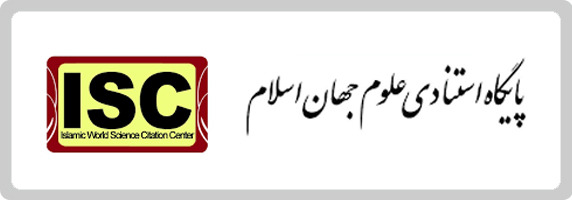Modeling the Effect of Personality Traits on Work Ethics with the Mediating Role of Job Adaptability
Keywords:
Personality traits, work ethics, job adaptability, structural equation modeling,, judiciary employeesAbstract
The aim of this study is to model the effect of personality traits on work ethics with the mediating role of job adaptability among employees of the Judiciary of the Islamic Republic of Iran. This correlational study utilized a structural equation modeling approach. The statistical population included all employees of the Judiciary Headquarters and Research Institute, from which 108 individuals were selected through convenience sampling. Data collection was conducted using three instruments: the NEO Five-Factor Inventory (NEO-FFI), Petty’s Work Ethics Questionnaire, and the Dawis and Lofquist Job Adaptability Scale. Data analysis was performed using SPSS and LISREL software. Path analysis results showed that extraversion, agreeableness, and conscientiousness had significant direct effects on work ethics, and also exerted significant indirect effects through job adaptability. In contrast, neuroticism and openness to experience were not statistically significant. Model fit indices such as χ²/df = 1.87 and RMSEA = 0.069 indicated an acceptable structural model fit. The findings suggest that certain personality traits can enhance ethical behavior at work through increased job adaptability. These results highlight the importance of assessing personality characteristics in recruitment, human resource development, and organizational interventions.
Downloads
References
Alizadegan, L., SamadiLargani, M., & Imeni, M. (2022). The Effect of Personality Type and Professional ethics on Auditors' Ability to Detect Fraud Using the Theory of Planned Behavior by theRole of Professional Skepticism. Financial Accounting and Auditing Research, 54(14), 49-78. https://doi.org/10.30495/faar.2022.693669
Asl, N., Dokaneifard, F., & Jahangir, P. (2022). Presenting a model for predicting emotional divorce based on personality traits and job self-efficacy mediated by perceived social support in working married women. Journal of counseling research. https://publish.kne-publishing.com/index.php/QJCR/article/view/8844
Ayat, M., Mollaei, E., Javanfekr, E., & Shafiee, S. (2020). A Study of Relationship Between Managerial Roles and Personality Traits of Women in Islamic Teachings. Women's Studies Sociological and Psychological, 18(4), 201-238. https://doi.org/10.22051/jwsps.2021.32839.2283
Brenning, K. M., De Clercq, B., Wille, B., & Vergauwe, J. (2020). Towards a fine-grained analysis of the link between borderline personality pathology and job burnout: Investigating the association with work-family conflict. Personality and individual differences, 162, 110030. https://doi.org/10.1016/j.paid.2020.110030
Diefendorff, J. M., Hall, R. J., Lord, R. G., & Strean, M. L. (2000). Action–state orientation: Construct validity of a revised measure and its relationship to work-related variables. Journal of Applied Psychology, 85(2), 250-263. https://doi.org/10.1037/0021-9010.85.2.250
Dilchert, S. (2018). Counterproductive sustainability behaviors and their relationship to personality traits. International Journal of Selection and Assessment, 26(1), 49-56. https://onlinelibrary.wiley.com/doi/abs/10.1111/ijsa.12204
Emami, D., Ahmadi, M., & Ghaffari, R. (2024). Presenting a Pattern of Flexible working Hours in Government Organizations with an Emphasis on Increasing the Productivity Level of Academic Employees in the Ministry of Cooperation, Labor and Social Welfare [Research Article]. Iranian Journal of Educational Sociology, 7(1), 57-65. https://doi.org/10.61838/kman.ijes.7.1.6
Evans, A. M., Meyers, M. C., Philippe, P. F. M. V. d. C., & Stavrova, O. (2021). Extroversion and Conscientiousness Predict Deteriorating Job Outcomes During the COVID-19 Transition to Enforced Remote Work. Social Psychological and Personality Science. https://doi.org/10.1177/19485506211039092
Farajzadeh Dehkordi, H. (2019). How Personality and Gender Relate to Ethical Judgment of Accountants: Evidence based on Discipline [Research]. Iranian journal of Value & Behavioral Accounting, 4(7), 181-208. https://doi.org/10.29252/aapc.4.7.181
Farhangi, A. A., Fotovat, B., Abdarzadeh, P., & Sarhadi Nezhad, M. (2017). The Role of Personality Traits on Job Involvement with Considering Quality of Work life as mediator. Public Management Researches, 10(37), 5-28. https://doi.org/10.22111/jmr.2017.3676
Gholampour, M., pourshafei, h., Farasatkhah, M., & Ayati, m. (2020). Components of Teachers’ Professional Ethics: A Systematic Review Based on Wright’s Model. Journal of Curriculum Studies, 15(58), 145-174. https://www.jcsicsa.ir/article_109377.html
https://www.jcsicsa.ir/article_109377_4d6abb7fa1187f64edb43b332577aed9.pdf
Goodarzi, S., & Hajiha, Zahra. (2018). The Relationship between Personality Characteristics and the Formation of Ethical Judgments [Research]. Ethics in Science and Technology, 12(4), 167-173. http://ethicsjournal.ir/article-1-891-en.html
Jafar Bahadori, K., Touraj Hashemi, N., & Mansoor, B. (2013). The relationship between psychological capital and personality traits with job satisfaction among librarians’ in public libraries in Tabriz. Pajoohandeh, 17(6), 313-319. http://pajoohande.sbmu.ac.ir/article-1-1420-en.html
Kalshoven, K., Den Hartog, D. N., & De Hoogh, A. H. B. (2011). Ethical Leader Behavior and Big Five Factors of Personality. Journal of Business Ethics, 100(2), 349-366. https://doi.org/10.1007/s10551-010-0685-9
Ok, C., Cho, E., & Park, J. (2023). The Impact of Workaholism on Job Satisfaction Depending on Personality: Focusing on the Moderating Role of Conscientiousness. The Institute of Management and Economy Research, 14(4), 217-231. https://doi.org/10.32599/apjb.14.4.202312.217
Pohling, R., Bzdok, D., Eigenstetter, M., Stumpf, S., & Strobel, A. (2016). What is Ethical Competence? The Role of Empathy, Personal Values, and the Five-Factor Model of Personality in Ethical Decision-Making. Journal of Business Ethics, 137(3), 449-474. https://doi.org/10.1007/s10551-015-2569-5
Wahab, M. A. (2017). Investigating the Nexus Between Personality Traits and Islamic Work Ethics. Asian Academy of Management Journal, 22(1), 183-213. https://doi.org/10.21315/aamj2017.22.1.8
Downloads
Published
Submitted
Revised
Accepted
Issue
Section
License
Copyright (c) 2025 حسین صادق (نویسنده); رضا خاکپور (نویسنده مسئول); عبدالله شفیع آبادی (نویسنده)

This work is licensed under a Creative Commons Attribution-NonCommercial 4.0 International License.






